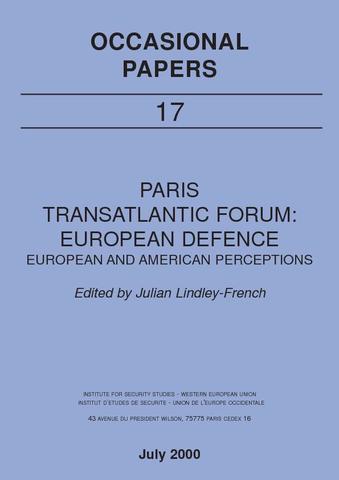You are here
Paris Transatlantic Forum: European defence - European and American perceptions

What was of particular interest in this seminar was that it combined both a discussion of the technical, immediate aspects of European defence and a more general reflection on developments in American policy and the direction being taken by European construction. I have the following three observations on the discussions on this somewhat unusual mixture of genres.
- The further forward one goes on the question of EU-NATO institutional relations – as witnessed, for instance, in the recent decisions taken by the EU’s Political Committee – the greater the incomprehension on the part of Americans on the very nature of the European Union and on the overall political significance of the EU’s defence dimension. Thus American questioning and anxieties always came back to the question of whether European defence was intended to strengthen the political side of European integration or to add to the Europeans’ military capability to resolve crises. Yet this dilemma of ‘narcissism’ or ‘utilitarianism’ was completely absent on the part of the Europeans, who repeatedly explained that European construction, including defence aspects, is not directed against the United States but represents strengthening of both the Union and of the Continent’s security. In the same way, American interventions systematically presupposed a direct comparison between NATO and the Union, as if the latter was or could become a military organisation of the same type as NATO.
- On the American side, the basic contradiction lies in the dilemma, clearly described by Philip Gordon, between the need for the effective sharing of burdens with the Allies and the almost structural propensity for US leadership. This ‘we need to lead’ attitude inherent in US foreign policy will in all probability not change with the next Administration, except in the unlikely event that the Europeans have de facto acquired and proved they have a similar aptitude. Yet the Europeans have developed, over several decades, a completely opposite practice and culture of sharing power, sovereignty and influence, which is the essence of integration within the EU and explains the complexity and extremely sensitive nature, for the European Union, of the question of leadership.
- Apart from Euro-American relations, the requirement to maintain or even strengthen public willingness to pay the price of defence was a recurring theme among European participants. The existential threat having disappeared for all countries in Europe, the best possible way to keep up the national and European defence effort was to give European citizens once more a sense of pride, in other words to give European defence issues a clear political dimension over and above any technical or institutional considerations.